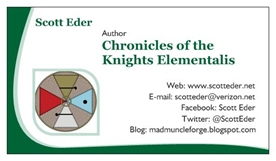A long time ago, at the dawn of the personal computing age, I dreamed of being an author. Toward the end of high school and through college, I wrote a few short stories, started a novel or two, and even wrote the opening scenes of a screenplay. I didn’t get published; Hell, I didn’t even try. I didn’t finish my books or screenplay. And yet I still dreamed of seeing my words, my thoughts, my stories in print and on bookstore shelves.
Life happened. The writing dream faded into the mists, a whim of childhood, replaced by the day-to-day grind. Career. Responsibility. Family. Debt. Promotion. Work more. House. Kids.
And no spare time.
Looking back, though, I realize it wasn’t a lack of time that kept me from pursuing my dream. No, it was a lack of commitment, of passion. Every once in a great while, my wife would ask me about writing, usually when I was grumping about this or that. She’d never forgotten what I wanted to be even though I had. When she broached the subject, I’d cringe and grouse that I’d used up all my words at work. Which, in a way, was true. I’d poured more than my daily allotment of meaningful words into meetings, emails, various technical documents, and random corporate discourse. At least, that’s what I told myself.
Years passed. Within the corporate gearworks, we speculated about our executives and what they would do when they hit forty. If they bought a motorcycle, it meant that they realized they’d reached the highest position they’d ever attain and accepted it. Otherwise, they’d buckle down, work harder, and grasp that next rung on the ladder.
Then I hit forty. Six months later, my mother was diagnosed with cancer. For the next five months, I split my days between being in the office and in the hospital with her, taking conference calls and checking emails from the waiting room to keep my projects on track.
She passed away in May. I left the company the first week in June.
Nothing makes you evaluate Life more than Death. So I did. After being in the corporate world for so long, though, I was trained to think a certain way—to get back into my field, to earn that paycheck, to resume that proverbial climb up the ladder. As I sat at my desk polishing my resume with all the vim and vigor of a sun-dried lemming for that inevitable plunge into the IT job market, I knew there had to be more. I didn’t want to return to a tedious world of cube farms and perimeter-lined offices, meetings scheduled to talk about meetings, and the humdrum slog making software widgets. My mom worked until she received her diagnoses and didn’t get to enjoy her retirement. I still had twenty plus years to grind away. Did I really want to strap on the yoke of the corporate overlords again? Hell no.
I glanced at the crammed bookshelves lining my wall. Fantasy novels. Stories of elves, dwarves, and dragons. Of knights and wizards. Of magic and chaos. Of good versus evil, light versus dark.
And in that moment, I remembered. Long ago, I wanted to be writer. It hit me hard and fast—the inspiration, the direction, the passion. Lost to the dream, I told my wife what I wanted to do. She and the kids supported my decision without hesitation. And so a writer was born.
The fact that I didn’t know how to write a novel really didn’t matter. I would learn thanks to David Farland’s classes and a strong, helpful writing community. But that’s a story for another post.

